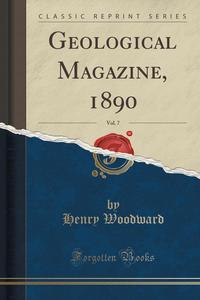Excerpt from Geological Magazine, 1890, Vol. 7
The huge horned Dinosaurs, from the Cretaceous, recently described by the writer, have now been investigated with some care, and much additional light has been thrown upon their structure and affinities. A large amount of new material has been secured, including several skulls, nearly complete, as well as various portions of the skeleton.
The geological deposits, also, in which their remains are found, have been carefully explored during the past season, and the known localities of importance examined by the writer, to ascertain what other fossils occur in them, and what were the special conditions which preserved so many relics of this unique fauna.
The geological horizon of these strange reptiles is a distinct one in the upper Cretaceous, and has now been traced nearly eight hundred miles along the eastern flank of the Rocky Mountains. It is marked almost everywhere by remains of these reptiles, and hence the strata containing them may be called the Ceratops beds. They are freshwater or brackish deposits, which form a part of the so-called Laramie, but are below the uppermost beds referred to that group. In some places, at least, they rest upon marine beds which contain invertebrate fossils characteristic of the Fox Hills deposits.
The fossils associated with the Ceratopsid? are mainly Dinosaurs, representing two or three orders, and several families. Plesiosaurs, Crocodiles and Turtles of Cretaceous types, and many smaller reptiles, have left their remains in the same deposits. Numerous small mammals, also of ancient types, a few birds, and many fishes, are likewise entombed in this formation. Invertebrate fossils and plants are not uncommon in the same horizon.
The Ceratopsid?, as the most important of this assemblage, will be first described fully by the writer, under the auspices of the United States Geological Survey. In the present paper, the skull of one of these gigantic reptiles is briefly described, and figured, as a typical example of the group.
About the Publisher
Forgotten Books publishes hundreds of thousands of rare and classic books. Find more at www.forgottenbooks.com
This book is a reproduction of an important historical work. Forgotten Books uses state-of-the-art technology to digitally reconstruct the work, preserving the original format whilst repairing imperfections present in the aged copy. In rare cases, an imperfection in the original, such as a blemish or missing page, may be replicated in our edition. We do, however, repair the vast majority of imperfections successfully; any imperfections that remain are intentionally left to preserve the state of such historical works. Это и многое другое вы найдете в книге Geological Magazine, 1890, Vol. 7 (Classic Reprint)
